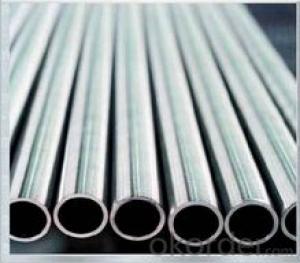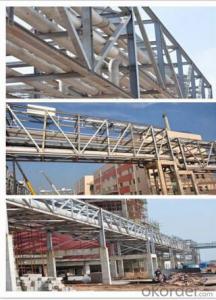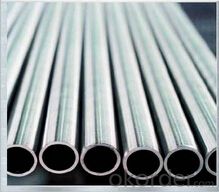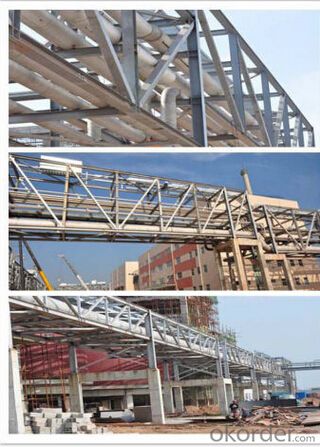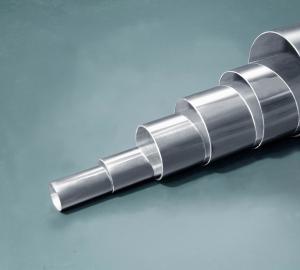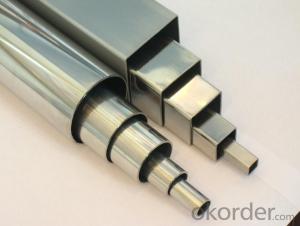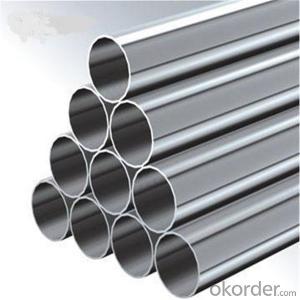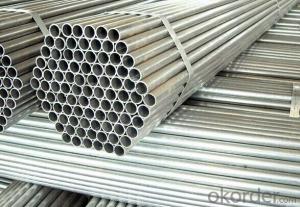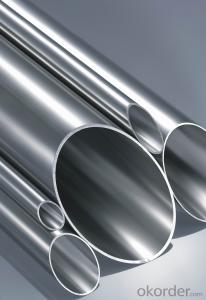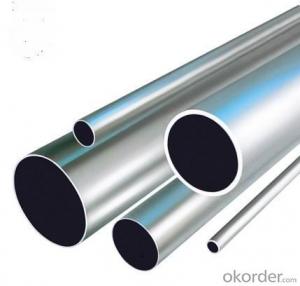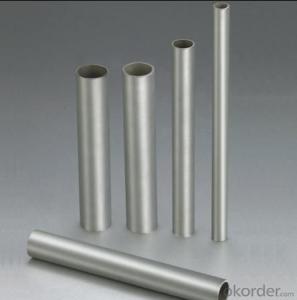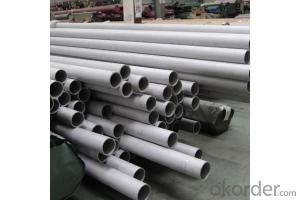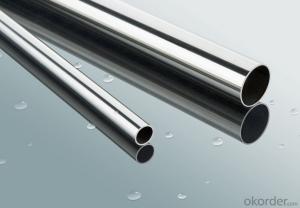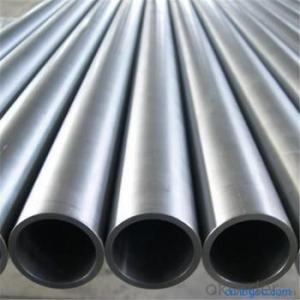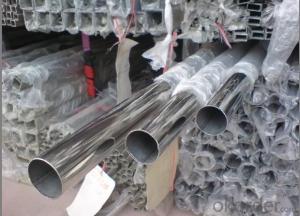STAINLESS STEEL BRIDGE STRUCTURE PIPE
- Loading Port:
- China Main Port
- Payment Terms:
- TT OR LC
- Min Order Qty:
- -
- Supply Capability:
- -
OKorder Service Pledge
Quality Product, Order Online Tracking, Timely Delivery
OKorder Financial Service
Credit Rating, Credit Services, Credit Purchasing
You Might Also Like
Specifications
1. Guaranteed material from established steel factories2. Accordance with International standard
3. Attractive 304 316price
PRODUCT NAME: STAINLESS STEEL BRIDGE STRUCTURE PIPE
| Name | STAINLESS STEEL BRIDGE STRUCTURE PIPE |
| Standard | ASTM, GB, JIS, DIN, EN, AISI |
| Material Grade | TP304 TP304L TP316 TP316L TP347 TP347H TP321 TP321H TP310 TP310S |
| TP410 TP410S TP403 | |
| S31803/S32205 S32750 S32760 | |
| Outer Diameter | Welded Pipe: single slit(Φ8mm-Φ630mm); girth(Φ630mm-Φ3000mm), |
| Thickness | Welded Pipe: single slit(0.5mm-25mm); girth(3mm-30mm) |
| Length | Commonly 5.8 Meters or 6.0 Meters, or as customers' request |
| Tolerance | According to the Standard, +/-10% Commonly. |
| Surface | 180#, 320#, 400# Satin / Hairline, Bright Anneal, Pickle,400#, 500#, 600# or 800# Mirror finish |
| Application | Petrochemical industry, chemical fertilizer industry, oil refining industry, oil and gas industry, light industry and food industry, pulp and paper industry, energy and environmental industries. |
| Test | Flaring test, Flattening test, Bending Test, Hydraulic Test, Eddy Current test |
- Q: Can stainless steel pipes be used for gas transportation?
- Indeed, gas transportation can indeed make use of stainless steel pipes. Stainless steel, known for its resistance to corrosion, possesses the ability to endure high-pressure circumstances. This characteristic makes it suitable for the conveyance of diverse gases such as natural gas, propane, and hydrogen. The strength, durability, and ability to withstand extreme temperatures exhibited by stainless steel pipes render them an unquestionably dependable choice for gas transportation. Moreover, the non-reactive nature of stainless steel guarantees the preservation of gas integrity and reduces the likelihood of contamination. All in all, the gas industry extensively employs stainless steel pipes due to their reliable nature, safety, and prolonged lifespan.
- Q: Can stainless steel pipes be used for underground drainage systems?
- Yes, stainless steel pipes can be used for underground drainage systems. Stainless steel is a durable and corrosion-resistant material that can withstand the harsh conditions often found underground, such as moisture, soil chemicals, and varying temperatures. It is also resistant to rust, which is a common problem in other types of pipes. Additionally, stainless steel pipes have a long lifespan and require minimal maintenance, making them a suitable choice for underground drainage systems.
- Q: What are the different surface finishes available for stainless steel pipes?
- There are several different surface finishes available for stainless steel pipes, each with its own unique characteristics and uses. 1. Mill Finish: This is the basic finish that stainless steel pipes come with after manufacturing. It has a dull, rough appearance and is suitable for applications where aesthetics are not a major concern. 2. Brushed Finish: Also known as satin finish, this surface finish is achieved by brushing the stainless steel pipe with abrasive material. It creates a smooth, brushed appearance with fine lines running in one direction. Brushed finish is commonly used in architectural applications and can provide a more polished look compared to the mill finish. 3. Mirror Finish: This is the most reflective surface finish available for stainless steel pipes. It is achieved by polishing the surface to a high gloss using progressively finer abrasives. Mirror finish is commonly used in decorative applications and provides a sleek, reflective appearance. 4. Polished Finish: This finish falls between the brushed and mirror finishes. It is achieved by polishing the surface to a smooth, shiny appearance using finer abrasives than the brushed finish. Polished finish is often used in applications where a more refined, but not overly reflective, look is desired. 5. Bead Blasted Finish: This finish is achieved by blasting small glass beads against the surface of the stainless steel pipe, creating a uniform matte appearance. Bead blasted finish is commonly used in industrial applications where a non-reflective surface is required, such as in food processing or pharmaceutical industries. 6. Electropolished Finish: This is a specialized surface finish that involves electrochemical polishing of the stainless steel pipe. It removes surface imperfections, enhances corrosion resistance, and creates a smooth, bright appearance. Electropolished finish is commonly used in industries that require high sanitary standards, such as pharmaceutical and biotechnology. These are just a few of the different surface finishes available for stainless steel pipes. The choice of finish depends on the specific application requirements, such as aesthetics, corrosion resistance, and cleanliness.
- Q: Can stainless steel pipes be used for steam applications?
- Indeed, stainless steel pipes have the capability to serve steam applications. Stainless steel possesses remarkable characteristics such as exceptional resistance to high temperatures and corrosion, rendering it appropriate for steam systems. It can endure the immense pressure and temperatures necessitated by steam applications without distorting or corroding. Moreover, stainless steel pipes exhibit durability and possess a lengthy lifespan, establishing them as a dependable option for steam applications. Furthermore, the ease of welding stainless steel pipes guarantees a secure and leakage-free steam system.
- Q: Are stainless steel pipes suitable for oil refineries?
- Stainless steel pipes, known for their high resistance to corrosion, prove to be a suitable choice for oil refineries. This is particularly important in environments abundant with corrosive substances like crude oil and various chemicals involved in refining procedures. Moreover, stainless steel pipes possess the ability to withstand both high temperatures and pressures, thus making them the perfect means for transporting oil and gas within the refinery. In addition to this, the low maintenance requirements and long lifespan of stainless steel pipes reduce the frequency of replacements, resulting in minimal downtime. In conclusion, stainless steel pipes offer the durability, reliability, and corrosion resistance necessary to meet the demanding conditions of oil refineries.
- Q: Can stainless steel pipes be threaded with NPT threads?
- Yes, stainless steel pipes can be threaded with NPT (National Pipe Thread) threads. NPT is a widely used standard for pipe threads in the United States, and it is suitable for both stainless steel and other materials. However, it is important to note that stainless steel has a higher strength and hardness compared to other materials, which may require more care and attention during the threading process. Additionally, it is recommended to use lubricants or cutting fluids specifically designed for stainless steel to ensure a smooth and accurate threading operation.
- Q: Can stainless steel pipes be used for oil and gas pipelines?
- Certainly, oil and gas pipelines can utilize stainless steel pipes. Stainless steel possesses remarkable resistance to corrosion, rendering it an apt material for the conveyance of oil and gas, which may encompass corrosive components. Stainless steel pipes exhibit the capacity to endure elevated temperatures and pressures, thereby rendering them optimal for oil and gas applications. Furthermore, stainless steel exhibits durability and longevity, thereby diminishing the likelihood of pipeline system leaks or malfunctions. The utilization of stainless steel pipes for oil and gas pipelines guarantees the integrity and dependability of the infrastructure, safeguarding both environmental preservation and public safety.
- Q: What is the tensile strength of stainless steel pipes?
- The tensile strength of stainless steel pipes can vary based on the specific grade and composition of the steel. However, stainless steel is renowned for its high tensile strength, making it a popular choice for various applications that demand sturdy and long-lasting pipes. On average, stainless steel pipes possess a tensile strength that falls within the range of 500 to 1500 megapascals (MPa). Thanks to this remarkable tensile strength, stainless steel pipes can endure substantial pressure and stress, rendering them suitable for utilization in industries like construction, oil and gas, chemical processing, and automotive manufacturing. It is worth noting that the precise tensile strength of stainless steel pipes can be influenced by factors such as the manufacturing process, heat treatment, and any additional alloying elements present in the steel. Consequently, referring to the specific technical specifications or standards for the particular grade of stainless steel pipes is crucial in order to ascertain their exact tensile strength.
- Q: What is the maximum operating temperature for stainless steel pipes?
- The maximum operating temperature for stainless steel pipes can vary depending on the grade of stainless steel used. However, in general, stainless steel pipes can typically withstand temperatures up to 1200 degrees Fahrenheit (650 degrees Celsius).
- Q: Are stainless steel pipes suitable for food processing industries?
- Yes, stainless steel pipes are highly suitable for food processing industries. Stainless steel is a preferred material in these industries due to its excellent corrosion resistance, durability, and hygiene properties. Stainless steel pipes do not react with food or alter its taste, and they are resistant to staining, rusting, and chemical damage. This makes them ideal for transporting various food products, including liquids, gases, and solids. Additionally, stainless steel pipes are easy to clean and maintain, reducing the risk of contamination and ensuring food safety.
Send your message to us
STAINLESS STEEL BRIDGE STRUCTURE PIPE
- Loading Port:
- China Main Port
- Payment Terms:
- TT OR LC
- Min Order Qty:
- -
- Supply Capability:
- -
OKorder Service Pledge
Quality Product, Order Online Tracking, Timely Delivery
OKorder Financial Service
Credit Rating, Credit Services, Credit Purchasing
Similar products
Hot products
Hot Searches
Related keywords
